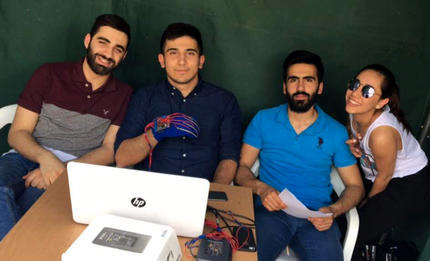LAU students create a sign language translating glove
With their project, seniors in mechanical engineering demonstrate quality, innovation and civic engagement and get international exposure.

The students presented their “Sign Language Translating Glove” at the Fourth Lebanese Diaspora Energy conference this past May.
“After observing the society that we live in, we realized that people with hearing and speaking difficulties find it hard to communicate with others,” said mechanical engineering student Hadi Yassin. “So we decided to create a glove that would translate their sign language into speech that people would easily understand.”
In spite of a heavy study workload, it took the four seniors in mechanical engineering just three months to develop the prototype, which consists of a regular nylon/fabric glove connected to a computer through wires and myRio―a reconfigurable Input/Output technology developed by National Instruments. The first stage in constructing the glove entailed researching the hardware in order to measure hand gestures in the best possible way. Once the hardware was built, the team worked on a machine-learning algorithm that predicted the gesture as the user signed it. In the final data collection stage, the innovators sought the help of students at The Learning Center for the Deaf in Baabda, who took turns in wearing the glove and signing. Each gesture transmitted by the sensor attached to the glove was recorded as a separate number that could then be used to “train” the glove.
Head of the Early Intervention Program at The Learning Center for the Deaf, Nadine Ismail, commended the students’ “great initiative” as it brought “both hearing and deaf students together to work on a project related to the Lebanese deaf community and their sign language.”
What began as a mandatory course project led to international exposure when Yassin and his teammates, Jawad Kanso, Ali El Hajj, and Rim Al Saadi were chosen to present their final product—the “Sign Language Translating Glove”—at the Fourth Lebanese Diaspora Energy (LDE) conference this past May. Held at BIEL in Beirut, the conference—organized by the Lebanese Ministry of Foreign Affairs—brought together more than 3,000 participants from both Lebanon and abroad, as part of the ministry’s broader efforts to strengthen ties between the Diaspora and the home country.
Being selected to showcase “The Sign Language Translating Glove” at the LDE was not only motivating, said El Hajj, but also extremely rewarding. “People at the conference really appreciated our project, and it felt good to know that we had accomplished a humanitarian deed.” The interaction the team enjoyed with the hearing impaired at the school was an experience in itself, he added. “The students were excited at the prospect of having such a communication tool available,” El Hajj said. “They kept on asking us when it would be ready.”
Yassin sees a direct link between the presentation and the future evolution of the glove his team developed. “We are planning to improve our glove in order to make it a product that may be used by all people easily and at a low cost. The conference allowed us to see that investors like the project and may be willing to support our endeavor.”
Encouraging LAU students to participate in the conference fit neatly into LAU’s overall mission of ensuring a seamless transition between the university and the workplace. “It is important to publicly demonstrate the quality and innovation of the projects that our students are working on,” said Assistant Dean of the School of Engineering Barbar Akle. “The LDE was an opportunity for them to pitch and present their projects to the public and, most importantly, to potential investors,” he added.
And so it was for the four LAU innovators. “Being able to present and advertise our glove in the Lebanese Diaspora Energy (LDE) was a great opportunity for all of us,” said Al Saabi. “As students, experiencing real life in the field through such a huge conference was an unexpected advantage to market our project. Otherwise, it would not have become as important as it is now.”
More
Latest Stories
- Into the Psychology of Justice
- Alumnus Zak Kassas on Navigation, Spoofing and the Future of GPS
- Hearing Between the Lines
- LAU Hematology Conference 2025: Advancing Science Through Interdisciplinary Exchange
- Dr. Chaouki T. Abdallah Invested as LAU’s 10th President
- LAU Guides Its Students Through the Code of Conduct
- Innovative Procedure at LAU Medical Center–Rizk Hospital Signals Hope for a Patient With a Congenital Disease
- LAU’s Inaugural PodChat Session Addresses AI Detection in the Classroom

